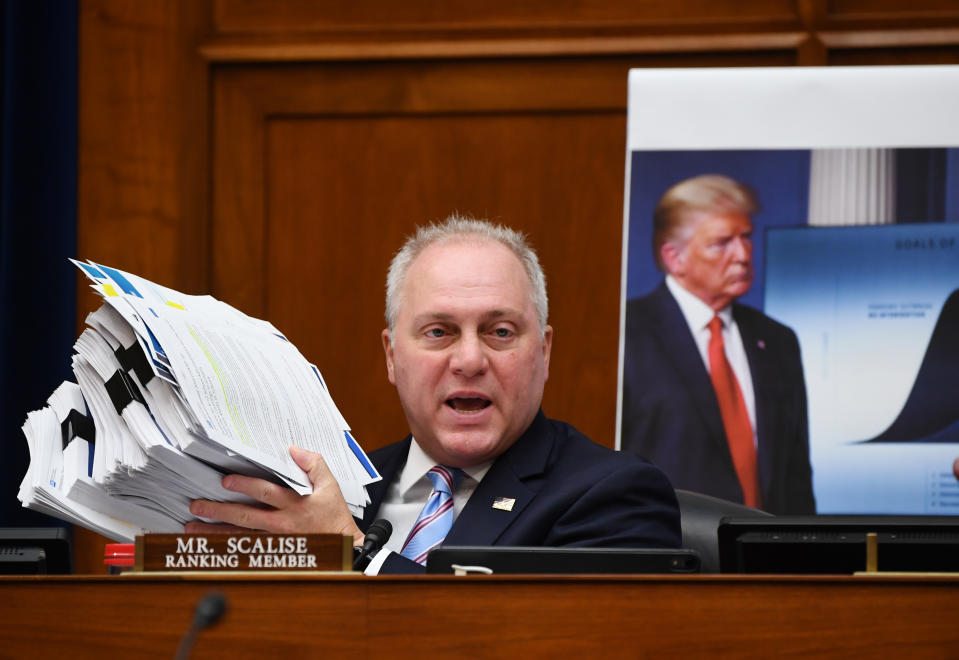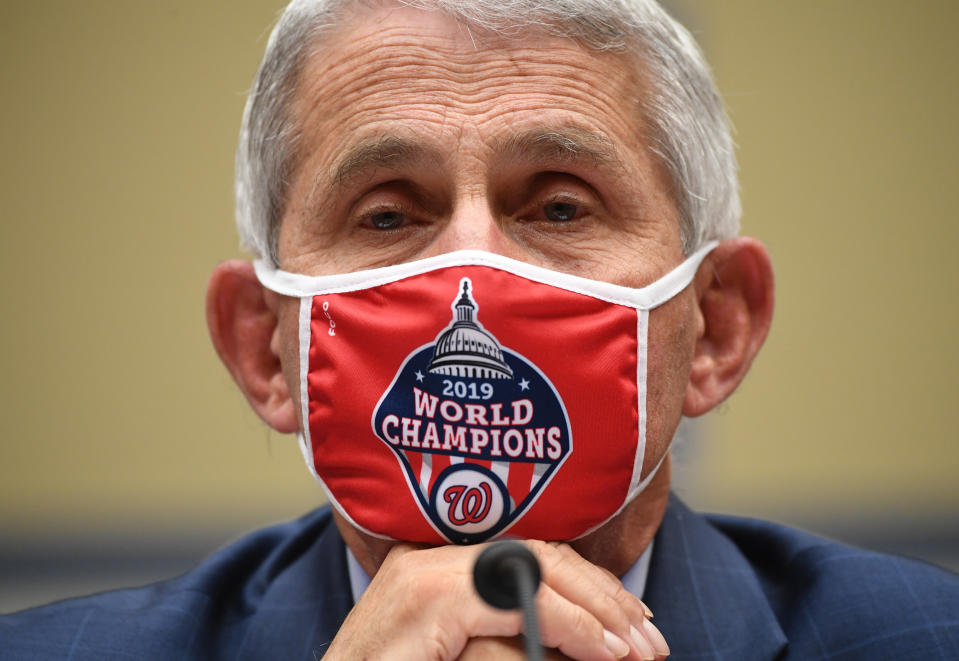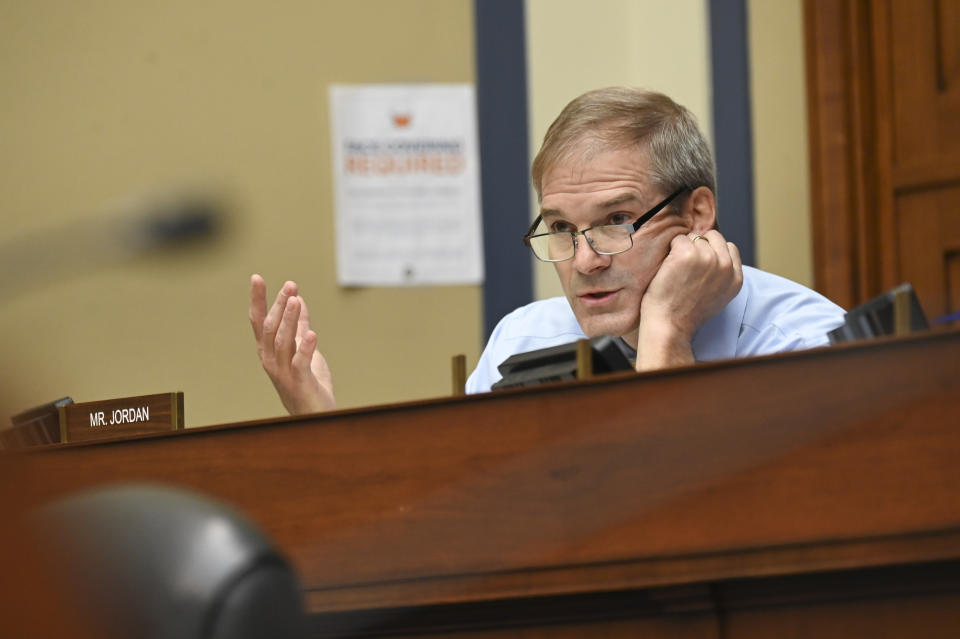Republicans attack Fauci and defend Trump at coronavirus hearing
WASHINGTON — Republicans used a House hearing on the coronavirus pandemic to praise President Trump and sometimes criticize Dr. Anthony Fauci, a leading member of the White House coronavirus task force who has sometimes earned the ire of conservatives.
The hearing took place Friday before a coronavirus subcommittee of the House Oversight Committee. Democrats had provocatively titled it “The Urgent Need for a National Plan to Contain the Coronavirus.”
In his opening statement, subcommittee Chairman James Clyburn, D-S.C., a leader of the Democratic caucus in the House of Representatives, referred to a Vanity Fair report published the day before that outlined how the Trump administration decided not to implement a national response early in the course of the pandemic because the viral outbreak appeared to be confined mostly to Democratic states.
“Instead, the president has downplayed the severity of the crisis, claiming the virus will disappear, sidelining government experts who disagree and seeking to legitimize discredited remedies,” Clyburn charged.
“The result of these decisions is that the virus has continued to rage out of control and our nation’s economic misery has continued,” Clyburn went on, arguing that the administration’s decision to cede responsibility for pandemic response to the states, while also urging those states to reopen, has only worsened the human, economic and societal costs of the pandemic.
Republicans argued that a coherent federal plan did exist, and launched counterattacks directed at Fauci, Democratic governors and China, where the virus originated in late 2019.
At one point, Rep. Steve Scalise, R-La., a leading Republican in the House and a Trump ally, brandished hundreds of sheets of paper to demonstrate how many plans already did exist. Scalise praised the stack as representing “President Trump’s effective plan to keep Americans safe” from a pandemic that has killed more than 152,000 people in this country.

The problem, critics have said, is that the administration has never committed itself fully to one of those plans. Instead, led by Trump himself, it has vacillated almost daily between calls for greater safety measures and celebrations of early-reopening states like Texas and Florida. Recent outbreaks in those states have led the administration to reconsider its rush to reopen, but not enough to order the kinds of lockdowns that shut down much of the economy in the spring.
The dramatic high point of the hearing came during a heated exchange between Fauci, who heads the National Institute of Allergy and Infectious Diseases at the National Institutes of Health, and Rep. Jim Jordan, R-Ohio, one of the president’s most devoted supporters in Congress.
Jordan seemed to argue that the antiracism protests that shook the nation throughout much of June could have led to the spread of the coronavirus. Research suggests that the protests did not lead to any outbreaks, perhaps because the protesters were outside and were mostly wearing masks.
Jordan, however, was determined to make his point, peppering Fauci with questions about the need to limit all large gatherings.
“Crowding together, particularly when you’re not wearing a mask, contributes to the spread of the virus,” Fauci said.
“Should we limit the protesting?” the famously pugnacious Jordan demanded.
Fauci seemed confused by the question, since freedom of peaceful assembly is widely understood to be guaranteed by the First Amendment.

“I don’t think that’s relevant to —” Fauci began to say.
Trump himself was watching the hearing from the White House and, as he is sometimes wont to do, weighed in on the proceedings via Twitter.
“Somebody please tell Congressman Clyburn, who doesn’t have a clue, that the chart he put up indicating more CASES for the U.S. than Europe, is because we do MUCH MORE testing than any other country in the World. If we had no testing, or bad testing, we would show very few CASES,” one message said.
A follow-up message from the president attacked the “Lamestream Media and their partner, the Do Nothing Radical Left Democrats.”
After clips of Jordan’s exchange with Fauci began being spread across social media, Trump fired off another tweet addressing it specifically.
“Great job by Jim Jordan, and also some very good statements by Tony Fauci,” the president wrote. “Big progress being made!”
The highly politicized atmosphere left little room for a substantive discussion of how to combat the coronavirus, which has recently devastated states across the Sun Belt and now appears to be moving to the Midwest. Trump himself has vacillated between solemnity and dismissiveness in his own approach to the pandemic. That has left him with low approval ratings ahead of November’s presidential election.
But defending Trump at Friday’s hearing proved a difficult and potentially politically perilous task, as evidenced by Jordan’s attack on Fauci regarding the Black Lives Matter protests. Jordan’s ultimate point was that while the protests were widely allowed and encouraged by many in government, some states had limited religious gatherings. Churches have been the sites of coronavirus hot spots in some places.
“There’s been no violence that I can see at church,” Jordan said. “I haven’t seen people during a church service go out and harm police officers or burn buildings.” He contrasted peaceful worship with the sometimes violent protests in Portland, Ore., which Trump controversially used federal officers to contain.
“No limit to protests, but, boy, you can’t go to church on Sunday,” Jordan said sarcastically, a staple of his congressional comportment.

Fauci, however, would not take the bait. “I don’t know how many times I can answer that,” he replied, the smile on his face wearing thin. “I’m not going to opine on limiting anything.”
“You’ve opined on a lot of things, Dr. Fauci,” Jordan shot back.
Having served five presidents prior to Trump, Fauci did not appear rattled by the attack. “I’m telling you what it is, the danger. And you can make your own conclusion about that. You should stay away from crowds no matter where the crowds are.”
There were more substantive moments during the hearing, as when Dr. Robert Redfield, director of the Centers for Disease Control and Prevention, admitted to Rep. Maxine Waters, D-Calif., that he had not been consulted on the Trump administration’s widely criticized decision to have hospitals send data directly to the federal Department of Health and Human Services, bypassing the CDC.
He also endorsed opening schools for in-person instruction in the fall, something that many of the largest districts around the country have been reluctant to do.
But the hearing often devolved into partisan theatrics. At one point, Rep. Blaine Luetkemeyer, R-Mo., noted that “young men playing football in high school” was likely as dangerous as reopening schools. It is not clear how he came to that conclusion, as it is not known what reopening schools will do to the course of the pandemic.
Near the end of the hearing, Scalise once more held up the manifold plans that he said constituted the sum of Trump’s impressive response to the crisis.
“There’s thousands more pages online,” he said.
_____
Read more from Yahoo News:



